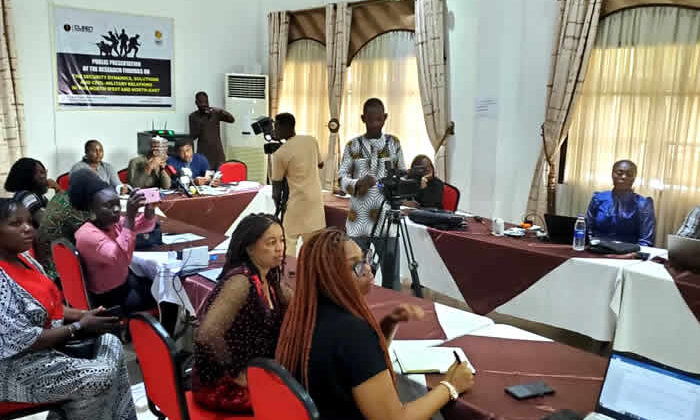Public Presentation of the Research Findings on the Security Dynamics, Solutions and Civil-Military Relations in the North West and North-East
In the last decade, Zamfara, Borno, Plateau and other States in North-east, North-central and North-west Nigeria have continued to suffer developmental challenges as a result of extreme group: Boko Haram and ISWAP as well as rural bandits. The Nigerian military were deployed on internal missions in the States affected by the insurgency in order to subdue the array of attacks on the civilian population. The Nigerian military, alongside other security agencies, have significantly degraded the capacity of the Boko Haram insurgents, and internally displaced people and refugees are now returning to their communities. The Military and the Vigilante groups such as the Civilian Joint Task Force and organized hunters who have supported the fight against Boko Haram present a unique challenge in how they relate with members of the host communities.
These issues were compounded by the kinetic approach initially adopted by the military and other dysfunctional approaches adopted by the security agencies thus creating a vacuum in cordial civil military relations in the affected states in North East and North West Nigeria. Adopting Non–kinetic approaches by the military and non-military security forces, and improving their effectiveness in the fight against insurgency is an urgent necessity to improve civil military relations.
Observations:
- Perceived Impact on Insecurity: The qualitative findings reveal a spectrum of perspectives regarding the effect of military operations. Some stakeholders and community members perceive these operations as positively contributing to enhanced security by countering insurgent activities.
- Civilian Safety and Protection: Safety and protection of civilians emerge as paramount concerns within the qualitative discussions. Both stakeholders and community members critically evaluate the extent to which military operations have effectively shielded civilians, especially those residing in conflict-affected areas and internally displaced persons (IDP) camps.
- Human Rights and Accountability: Stakeholders and community members voice apprehensions regarding alleged human rights violations occurring during military operations. The recurring emphasis underscores the pressing need for robust mechanisms of accountability to address such violations.
- Community Engagement and Trust-Building: The qualitative data emphasize the significance of community engagement and trust-building in the context of military operations. These evaluations revolve around collaborative efforts, information sharing, and community involvement in security matters.
- Communication and Transparency: Effective communication and transparency emerge as recurring themes within the qualitative interviews. Both stakeholder groups stress the pivotal nature of clear and transparent communication channels between the military and civilians.
- Conflict Resolution and Mediation: Conflict resolution and mediation efforts are discussed as pivotal instruments for addressing disputes and preventing violence. Stakeholders and community members acknowledge the role of collaborative initiatives involving the military, local leaders, and civil society organizations in de-escalating conflicts and promoting peace.
Findings:
- Firstly, there is an unequivocal need for enhanced transparency and accountability within security agencies. This entails ensuring that mechanisms are in place to investigate and address abuses promptly and effectively.
- Community engagement takes center stage as a vital component of improving civil-military relations.
- Building trust between security agencies and the communities they serve is a two-way endeavor.
- Furthermore, the assessment underscores the importance of continuous dialogue and communication between security agencies, policymakers, civil society organizations, and the broader public.
- Transparency in security operations, as well as the dissemination of accurate information, helps dispel misconceptions and mitigates tensions that can arise due to a lack of understanding.
Recommendations
- Enhance Transparency and Accountability in Security Operations: Security agencies should establish clear mechanisms for reporting and addressing abuses promptly and impartially. Conduct regular internal investigations into alleged abuses by military personnel and ensure that perpetrators are held accountable through appropriate legal channels.
- Community Engagement and Trust-Building: Implement community engagement programs to facilitate open dialogue between security agencies and the civilian population.
- Gender-Sensitive Approaches in the Rules of Engagement: Develop gender-sensitive training programs for security personnel to address issues such as sexual violence and harassment, with a focus on respecting the rights and dignity of women and girls.
- Youth Engagement: Design outreach and communication strategies aimed at engaging youth in security-related initiatives, including efforts to counter extremism and promote community safety.
- Public Awareness Campaigns: Launch public awareness campaigns that educate communities about the presence of security agencies in their communities.
- Inter-Agency Collaboration: Encourage and facilitate collaboration and coordination among security agencies, particularly in crisis situations. Joint Task Forces should work seamlessly to provide efficient responses to security threats.
- Holistic Security Approaches: Develop holistic security strategies that consider gender-specific preferences and address the diverse needs of the population.
- Ongoing Assessment and Research: Conduct regular assessments and research to monitor evolving perceptions and preferences of civilians regarding security agencies.
- Civil Society Engagement: Encourage civil society organizations to actively advocate for the rights of victims, provide legal assistance to those affected by abuses, and hold security agencies accountable for their actions.
- Government Commitment: The government should demonstrate a strong commitment to addressing security challenges and abuses, by addressing issues around poverty, inequalities in the communities and also allocating sufficient resources to security agencies supporting intelligent led security approaches and implementing policy reforms where necessary.
CLEEN Foundation is grateful to International Alert who is a consortium member in the implementation of this project as well as Open Society Africa for their technical and financial support on the project.
Gad Peter
Executive Director







